Business IN ACTION
BLUE MEDICAL
Cambiando el mundo a través de la medicina preventiva y el cuidado de pacientes Crónicos
pág. 10

PFIZER
Invertir en salud es invertir a futuro
pág. 14
COMITÉ DE SALUD


BLUE MEDICAL
Cambiando el mundo a través de la medicina preventiva y el cuidado de pacientes Crónicos
pág. 10

PFIZER
Invertir en salud es invertir a futuro
pág. 14


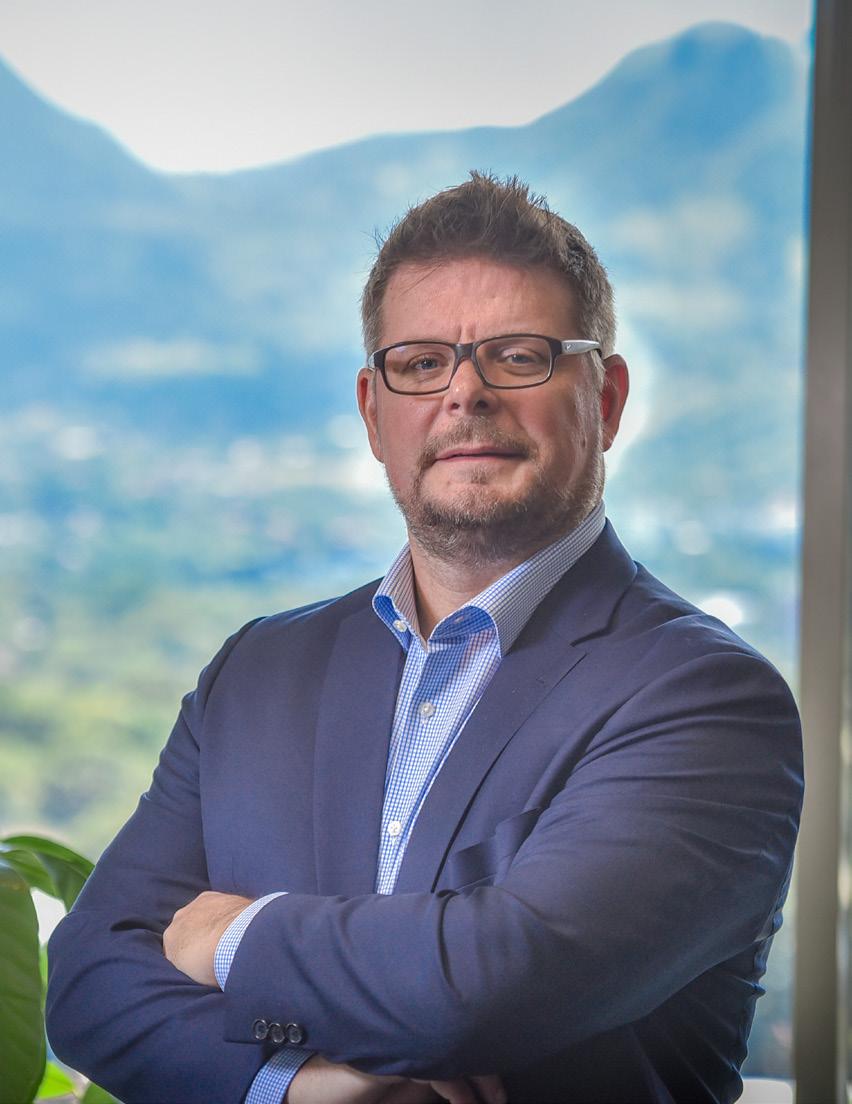


Leadership Circle
BLUE MEDICAL
10
Cambiando el mundo a través de la medicina preventiva y el cuidado de pacientes Crónicos
Changing the world through preventive medicine and chronic patient care
Estuardo Biguria | CEO, Blue Medical
14
PFIZER
Invertir en salud es invertir a futuro
Investing in health is investing for the future
Bradley Silcox | Gerente General
22
BAYER
Inversión en Salud en Guatemala
Investing in Health in Guatemala
Natalia González Jiménez | Health policy & advocacy manager
43
President
María Stella Román de Aragón
AmCham's Executive Director
Waleska Sterkel
Executive Director Assistant
Grethel Rendón
Trade Center Manager
Grecia Ramírez
Committees Coordinator
Ana Lucía Pérez
Committees Assistant
Mariana Izquierdo
Communications Coordinator
Lisa Peña
Layout & Design
Erwin Acajabón
Translation
International Business Academy
26
MSD
Guatemala: Hub de investigación y desarrollo para MSD en Centroamérica y Caribe Guatemala: A research and development hub for MSD in Central America and the Caribbean
Andrea Angulo | Communications Lead
34 38
SOMIT
Minimizar el impacto económico en la salud Minimize the economic impact on you health
Javier Jerez | Ejecutivo de Cuentas Clave
TRANSCORP, CORREDORES DE SEGUROS
La salud es un privilegio Health is Privilege
Armando Palma H. | Director General
46
BLUE MEDICAL
Estuardo Biguria CEO, Blue Medical
PFIZER
Bradley Silcox Gerente General
BAYER
Natalia González Jiménez Health policy & advocacy manager
MSD
Andrea Angulo Communications Lead
SOMIT
Javier Jerez
Ejecutivo de Cuentas Clave
TRANSCORP, CORREDORES DE SEGUROS
Armando Palma H. Director General

La sostenibilidad del sistema de salud se vuelve cada vez más importante. Los proveedores de atención médica de todo el mundo están buscando formas de mejorar el acceso a los servicios de salud y brindar una mejor calidad de atención a sus pacientes; unido esto, la salud digital está jugando un papel importante en esta transformación. En todo el mundo, los gobiernos y las empresas privadas están invirtiendo fuertemente en plataformas y aplicaciones digitales que facilitarán el acceso de las personas a los servicios de salud. ¿Podemos esperar un cambio dramático en la forma en que se brinda la atención médica a medida que estas tecnologías digitales se adoptan más ampliamente? Esto podría reducir los costos y aumentar la eficiencia de los servicios de atención médica al aprovechar el poder de las tecnologías impulsadas por IA, como los algoritmos de aprendizaje automático.
Es importante, además, hablar de la inversión en investigación, promoción y educación de salud integral para mejorar la vida de los guatemaltecos y crear un futuro más saludable para todos.
The health system’s sustainability is increasingly becoming more important. Healthcare providers around the world are seeking ways to improve access to health services and provide better quality of care to their patients. At the same time, digital health is playing an important role in this transformation. Around the world, governments and private companies are investing heavily in platforms and digital applications that will facilitate the access to health services to people. Can we expect a dramatic change in the way healthcare is provided as these digital technologies are more widely adopted? This could reduce costs and increase efficiency of healthcare services by leveraging the power of technologies driven by AI, such as machine learning algorithms.
It is also important to talk about investment in comprehensive health research, promotion and education in order to improve the standard of living of Guatemalans and create a healthier future for all.
 Executive Director
Executive Director
Estimado lector,
Nuestro Comité de Salud de AmCham aborda diversos tópicos en torno a los servicios de atención sanitaria, el fortalecimiento de la prevención y vacunación, el acceso a la innovación, entre muchos otros temas importantes a poner sobre la mesa, como los desafíos actuales que enfrenta la prestación de servicios de salud en Guatemala, como la falta de acceso, la infraestructura inadecuada y la falta de recursos.
En esta edición, contamos con expertos de Blue Medical y Pfizer, miembros de nuestro Leadership Circle; así como, de Bayer y MSD Centroamérica, representando al Comité de Salud para exponer temas de inversión en salud, medicina preventiva, cuidado de pacientes crónicos y el desarrollo de investigaciones.
¡Espero que esta publicación nutra su conocimiento y curiosidad!
Dear reader,
Our AmCham Health Committee addresses several topics around healthcare services, the strengthening of prevention and vaccination, access to innovation, among many other important issues to bring to the table, like the current challenges faced by the health services in Guatemala such as lack of access, inadequate infrastructure and insufficiency of resources.
In this edition, we feature experts from Blue Medical and Pfizer, members of our Leadership Circle, as well as from Bayer and MSD Central America, representing the Health Committee to present topics about health, preventive medicine, chronic patient care and research and development.
I hope this edition expands your knowledge and sparks your curiosity!

 Estuardo Biguria CEO, Blue Medical
Estuardo Biguria CEO, Blue Medical


En Guatemala tenemos algunas costumbres muy arraigadas que no siempre nos juegan a favor, y una de ellas es considerarnos “muy fuertes” y hacer poco caso a los síntomas en su etapa inicial. “Todavía no me duele mucho… ya se me va a pasar… yo casi ni me enfermo…” son algunas de las frases que escuchamos todos los días y estas pueden ser el peor enemigo de nuestra salud.
Cada día es más frecuente escuchar sobre dolores de cabeza y espalda, gastritis y problemas estomacales, infecciones urinarias y padecimientos respiratorios. Muchas veces no relacionamos estos síntomas con todas las posibles causas, pero el estrés, ritmo de vida acelerado, tráfico, presión social, alimentación poco saludable, son solo algunos de los factores que afectan nuestra salud.
Eso nos debería llevar a cuestionamientos muy importantes, ¿Sabemos realmente cómo está nuestra salud?, ¿Cómo se si tengo algún padecimiento?, ¿Qué debo hacer para solucionarlo?, ¿A dónde acudo para que me ayuden?
Los padecimientos crónicos como Diabetes Mellitus, Hipertensión, Dislipidemia, Hipotiroidismo, por mencionar algunos los tiene el 15% de la población (fuente: Estudio sobre 650,000 fichas clínicas, BlueMedical enero 2023), pero en muchos de los casos no lo descubre hasta que el padecimiento está muy desarrollado. En los últimos 15 años solo la Hipertensión Arterial ha aumentado un 187% (fuente: Prensa Libre. Mayo 2023), y se estima que el 40% de las personas hipertensas aún no saben que tienen ese padecimiento.
En Blue Medical constantemente buscamos más y mejores opciones para desarrollar productos y servicios que pueden ayudar a identificar, diagnosticar, tratar y proveer de los recursos indispensables, a la población, para dar un mejor nivel de vida por un tiempo más prolongado. Esto a través de programas médicos, jornadas preventivas empresariales y productos que facilitan la adherencia a los tratamientos y medicamentos que se necesitan.
El objetivo de las jornadas empresariales es
Cambiando el mundo a través de la medicina preventiva
educar a los colaboradores, por medio de charlas educativas que brindan información relevante sobre padecimientos de alto impacto en la población, ayudándolos a identificar padecimientos tempranos, identificar síntomas que normalmente no se asocian a padecimientos, crear conciencia sobre la importancia de adherirse correctamente a los tratamientos y sobre todo hablamos de los riesgos de no tratarse a tiempo, así como los beneficios y calidad de vida que se puede lograr por un tratamiento preventivo o temprano.
Parte de nuestras jornadas son los tamizajes para la detección temprana de padecimientos y la correcta guía para un seguimiento certero y confiable que pueda validar o descartar una enfermedad. Esto ayuda a las empresas a mantener espacios saludables y alta productividad creando conciencia en los colaboradores sobre su cuidado personal que empieza con la oportunidad de tener un chequeo a su alcance.
Estos servicios son complementados con una red de clínicas integrales con médicos especialistas, laboratorios y exámenes, farmacias protocolizadas

y atención de urgencias las 24 horas los 365 días del año.
Dentro de nuestro crecimiento, siempre enfocado en nuestro lema “Cuidamos de ti” hemos desarrollado Bluemeds, un programa que administra la compra y entrega de medicamentos que los pacientes toman de forma recurrente, llevándolos cada mes de forma automática y sin costo adicional hasta donde se necesita.
Una de las muchas ventajas de Bluemeds es que está enfocado tanto en las personas que tienen los padecimientos como en sus cuidadores habituales, en la mayoría de los casos familiares, desapareciendo una gran preocupación al hacer mucho más fácil y cómoda la gestión de los medicamentos (www. mibluemeds.com)
Seguimos tratando de cambiar el mundo y hacer de él un lugar más saludable, donde cada paciente es y será lo más importante, cada persona es el centro de nuestra atención, en Blue Medical cuidamos de ti.
It is more and more frequent to hear about headaches and back pain, gastritis and stomach ailments, urinary infections and respiratory diseases. Many times we do not associate these symptoms with all possible causes, but stress, fast pace of life, traffic, social pressure, unhealthy diet, are just some of the factors that affect our health.
This should lead us to very important questions: Do we really know how our health is? How do I know if I have a condition? What should I do to treat it? Where do I go to get help?
We have some deep-rooted habits in Guatemala that do not always work in our favor, one of them being to consider ourselves “very strong” and pay little attention to early symptoms. “It still doesn’t hurt much...it will pass...I hardly ever get sick...,” are some of the phrases we hear every day which can be the worst enemy of our health.
Chronic conditions such as Diabetes Mellitus, Hypertension, Dyslipidemia, Hypothyroidism, to mention a few, are suffered by 15% of the population (Source: Study on 650,000 clinical records, BlueMedical, January 2023), but in many cases the condition is not discovered until it is well developed. Hypertension alone has increased 187% in the last 15 years (Source: Prensa Libre, May 2023), and it is estimated that 40% of hypertensive individuals still ignore they have this condition.
Estuardo Biguria CEO, Blue Medical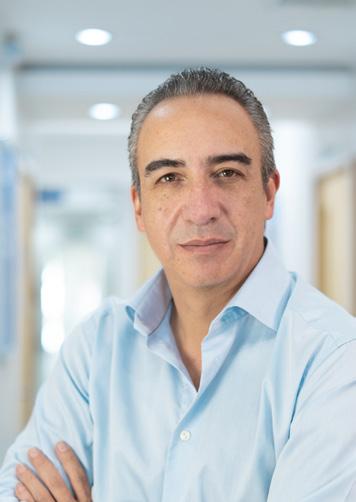
At Blue Medical we are constantly looking for more and better options to develop products and services that can help identify, diagnose, treat and provide the indispensable resources to the population in order to deliver a better standard of living for a longer period of time. This through medical programs, corporate preventive campaigns and products that facilitate adherence to needed treatments and medications.
The objective of the corporate preventive campaigns is to educate employees through educational talks that provide relevant information on high impact conditions in the population, helping to identify conditions in their early stages, identifying symptoms that are not normally associated with these conditions, raising awareness about the

“International trade strengthens a nation’s economy, which is why logistics must be operated with knowledge, honesty and good service.”
importance of correctly adhering to treatments, and above all, informing about the risks of not being treated in time, as well as the benefits and standard of living that can be achieved through preventive or early treatment.
Part of these campaigns are the screenings for the early detection of diseases and the correct guidelines for an accurate and reliable monitoring that can confirm or rule out a disease. This helps companies maintain healthy and highly productive work environments, raising awareness among employees about their personal care which begins at having a check-up within reach.
These services are complemented with a network of integral clinics with specialist Doctors, laboratories and exams, registered drugstores and emergency care 24 hours a day, 365 days a year.

As part of our growth, always focused on our motto
“We take care of you” we have developed the program Bluemeds that manages the purchase and delivery of medications that patients take on a recurring basis, taking them automatically each month and at no additional cost to wherever they are needed.
One of the many advantages of Bluemeds is that it is focused both on the individuals who have the conditions and their habitual caregivers (in most cases their relatives) making the management of medications much easier and more convenient therefore eliminating a great concern (www. mibluemeds.com).
We continue trying to change the world and make it a healthier place, where every patient is and will be the most important thing. Each person is the focus of our attention: At Blue Medical we take care of you.
Muchos países ven la inversión en salud como un reto; algunos porque sus sistemas no tienen los fondos suficientes y otros, porque segmentan el financiamiento y la prestación de servicios, de la forma menos eficiente, para tratar de salir adelante. Lo cierto es que una mayor inversión en salud impacta positivamente el desarrollo de un país y contribuye a tener poblaciones más sanas que, a su vez, suelen ser


más productivas e influyen en la economía de una nación.1
La pandemia por COVID-19 nos reveló problemas estructurales importantes a nivel de inequidad; sin embargo, también nos recalcó que la salud y la economía están estrechamente relacionadas, haciéndonos ver a la salud como un motor de crecimiento con una valiosa oportunidad de retorno en lugar de ser un costo.
Pero, ¿cómo la inversión en salud permite un crecimiento sostenible? A través de tres vías clave, como lo son la microeconómica -por ejemplo, mejorando e incrementando la expectativa de vida-, la macroeconómica intermedia -al reducir la brecha en salud por raza, género o estatus económico-, y la macroeconómica nacional, con efectos directos e indirectos incluyendo el aumento del Producto Interno Bruto (PIB), impulsado por alianzas público privadas, la investigación clínica, la propiedad intelectual, la generación de pequeñas empresas (como start-ups), así como, el impulso a la innovación y el logro de beneficios en infraestructura y seguridad.
De acuerdo con datos de la Comisión Económica para América Latina y el Caribe (CEPAL), el gasto público en salud en los países de Latinoamérica y el Caribe corresponde a cerca de un 3.8% del PIB, lo cual está muy lejos de la recomendación del 6% dada por la Organización Mundial de la Salud (OMS). Además, aproximadamente un 32.2% del gasto total en salud en dicha región corresponde al gasto del bolsillo de los hogares.2
Entonces, ¿de qué manera podemos alcanzar una inversión adecuada en salud?
La CEPAL recomienda colocar a los sistemas de salud y de protección social en el centro de cualquier estrategia de desarrollo sostenible. Por su parte, el
“Una mayor inversión en salud impacta positivamente el desarrollo de un país y contribuye a tener poblaciones más sanas y productivas a futuro.”
Dr. Tedros Adhanom Ghebreyesus, director general de la OMS, hace un llamado a repensar la economía desde una perspectiva de “Salud para todos”; es decir, cambios en el pensamiento económico y en los sistemas sanitarios locales, así como mundiales.
También, nosotros como industria debemos seguir trabajando juntos, para contrarrestar esos desafíos que no permiten ver a la salud como riqueza y que van de la mano de la implementación de marcos políticos y regulatorios sólidos, basados en la ciencia, así como en estándares internacionales para la presentación, revisión y autorización de productos.
Asimismo, hay que trabajar en el acceso a la innovación basado en el financiamiento estratégico, a largo plazo, del sistema sanitario. Para esto se requiere un modelo en donde se tomen decisiones basadas en evidencia, enfocado en resultados y que además sea transparente y consultivo para el establecimiento del presupuesto y la asignación de recursos.
En el caso de Pfizer, desde hace unos años para acá transformamos nuestro modelo de acceso y comenzamos a trabajar de cerca con las instituciones de salud pública de los países, para diseñar e implementar conjuntamente soluciones innovadoras e integrales, con el propósito de ofrecer un acceso equitativo a nuestras terapias, mientras contribuimos a fortalecer la sostenibilidad de los sistemas de salud.
Específicamente, utilizamos un enfoque basado en resultados, lo que significa que adaptamos acuerdos de acceso con base en evidencia del mundo real, que contribuyen al desarrollo de una mentalidad basada en la investigación clínica, y también, estamos en proceso de poner en práctica acuerdos basados en valor. Además, estamos implementando Programas de Asequibilidad, así como de Acceso Temprano, tanto a nivel público como privado, para facilitar la llegada de medicamentos innovadores en beneficio de los pacientes.
Otro punto medular de ese trabajo en equipo entre los actores del sector es aprovechar las soluciones de salud digitales y crear alianzas con estas para alcanzar su máximo potencial en atención médica y acceso, así como fomentar la adopción de nuevas herramientas.

Al día de hoy, en Pfizer, estamos comprometidos con hacer uso de las ventajas que ofrecen las herramientas digitales en las distintas áreas de la compañía, para mejorar las experiencias de los pacientes, profesionales de la salud, las instituciones y la sociedad en general. Contamos con plataformas y aplicaciones para dispositivos móviles, que pueden apoyar a los pacientes en el control de su enfermedad o inclusive, guiarlos para una adecuada atención médica.
Asimismo, hemos establecido alianzas con healthtechs de la región, ya que son clave en la creación de soluciones sanitarias sostenibles y adaptadas a la realidad de cada mercado, quienes, en colaboración con la academia, sociedades médicas, actores del sector privado e instituciones públicas, entre otros, han hecho que el sector salud se vuelva más eficiente, gracias a su capacidad de optimizar la atención médica con base en datos.
Finalmente, para que los países logren una adecuada inversión en salud es necesario contar con mercados abiertos y competitivos, en línea con los estándares internacionales y de la industria, y un sistema de adquisiciones transparente, así como basado en el valor.
La necesidad de invertir en salud está latente, aquí y ahora. La academia, los gobiernos, las empresas del sector, los profesionales de la salud y la sociedad en general debemos unirnos para aprovechar esas fortalezas colectivas en la construcción de ecosistemas de salud y economías equitativas, resilientes y sostenibles.
¡Invertir en los ecosistemas de salud promueve la competitividad y mejora, a futuro, la economía de un país…Es un beneficio para todos!
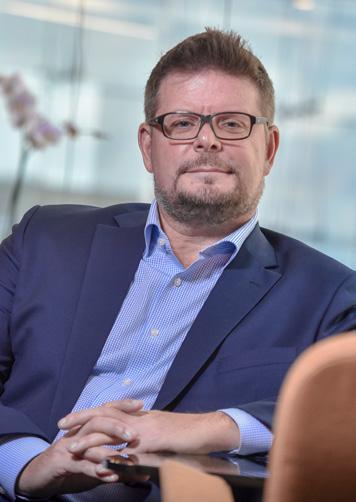
Many countries see investment in health as a challenge, some because their systems do not have enough funding and others because they segment financing and service delivery in the least efficient manner in order to get ahead. What is true is that greater investment in health impacts positively the development of a country and contributes to having healthier populations that in turn tend to be more productive, influencing the economy of a nation.1
The COVID-19 pandemic exposed important structural problems at the level of inequality. Nevertheless, it also highlighted that health and the economy are closely related, making us see health as a growth engine with a valuable opportunity for return on investment rather than a cost.
Even so, how does investment in health allow a sustainable growth? Through three key ways such as the microeconomic one - for example, improving and increasing life expectancy, the intermediate macroeconomic one – by reducing the health gap by ethnicity, gender or economic status and the national macroeconomic one - with direct and indirect effects, including the increase in Gross Domestic Product (GDP), driven by publicprivate partnerships, clinical research, intellectual property, the generation of small enterprises (such
as start-ups), as well as promoting innovation and achieving benefits in infrastructure and safety.

According to data from the Economic Commission for Latin America and the Caribbean (ECLAC), public spending on health in Latin American and Caribbean countries corresponds to about 3.8% of GDP, which is far from the 6% standard given by the World Health Organization (WHO). In addition, approximately 32.2% of total health spending in this region corresponds to out-of-pocket spending by households.2
So, how can we achieve an adequate investment in health?
The ECLAC recommends setting health and social protection systems at the core of any sustainable
Bradley Silcox General Manager
“A greater investment in health impacts positively the development of a country and contributes to having healthier and more productive populations in the future.”
development strategy.2 For his part, Dr. Tedros Adhanom Ghebreyesus, General Director of WHO, has called for rethinking the economy from a “Health for All” perspective, that is, changes in economic thinking and local and global health systems.3
Also, we as an industry must continue working together in order to counter those challenges that prevent us from seeing health as wealth and that go hand in hand with the implementation of solid political and regulatory frameworks, based on science, as well as international standards to present, review and authorize products.
In addition, it is necessary to work on access to innovation based on the long-term strategic financing of the health system. This requires a model where decisions are made based on evidence, focused on results and that is also transparent and consultative to set up the budget and the allocation of resources.
In the case of Pfizer, we transformed our access model some years ago and started working closely with the countries’ public health institutions in order to design and implement together innovative and integral solutions, with the aim of offering equitable access to our therapies, while contributing to strengthen the sustainability of health systems.
Specifically, we follow an approach based on results, which means that we adapt access agreements based on real world evidence which contribute to the development of a mindset based on clinical research, and also, we are in the process of implementing agreements based on value. In addition, we are implementing Affordability and Early Access Programs at both public and private levels to facilitate the arrival of innovative medicines to benefit patients.
Another key point of this teamwork among the sector’s players is to take advantage of digital health solutions and create partnerships with them to reach their maximum potential in medical care and access, as well as to promote the adoption of new tools.
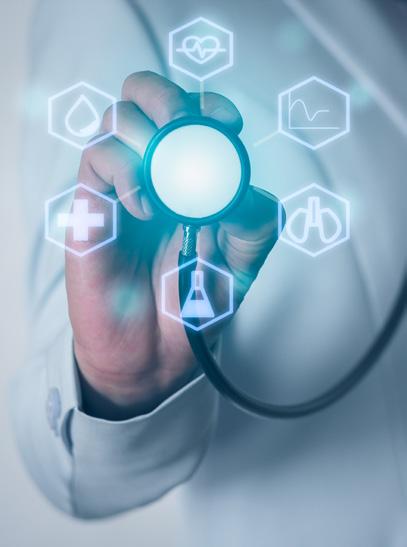
As of today, we at Pfizer are committed to making use of the advantages offered by digital tools in the different areas of the company in order to enhance the experiences of patients, health professionals, institutions and society in general. We have platforms and applications for mobile devices that can support patients in controlling their diseases or even leading them to adequate medical care.
Likewise, we have established partnerships with
healthtechs in the region, as they are key factors in the creation of sustainable health solutions adapted to the reality of each market, who, in collaboration with academia, medical societies, private sector and public institution players, among others, have made the healthcare sector to become more efficient, thanks to their ability to optimize healthcare based on data.
Finally, for countries to achieve an adequate investment in health, it is necessary to have open and competitive markets, aligned with international and industry standards and a transparent procurement system based on value.
The need to invest in health is latent, here and now. Academia, governments, the sector’s companies, health professionals and society in general must get together to take advantage of these collective strengths in the construction of health ecosystems and equitable, resilient and sustainable economies.
Investing in health ecosystems promotes competitiveness and improves the economy of a country in the long term… It is a benefit for all!
Leadership Circle es un programa exclusivo de patrocinadores de AmCham Guatemala el cual busca ser un aliado estratégico para su organización, brindándoles amplias oportunidades de desarrollo comercial, herramientas fundamentales para influir en el mercado de EE.UU., así como la facilitación de información y acercamiento a las agencias políticas, comerciales y regionales.
AmCham Guatemala crea este programa con el objetivo de brindar todos los servicios de una forma personalizada, brindando presencia de marca en toda nuestra comunicación apoyando así al crecimiento y desarrollo de su empresa.
Actualmente 25 empresas forman parte de este gran círculo y estamos orgullosos de poder representarlos.
Leadership Circle is an exclusive sponsorship program that supports AmCham Guatemala. In the search of being a strategic partner for each organization, we provide them plenty of opportunities for commercial development and the necessary tools to have in impact within the American Market. In addition, we also facilitate the gathering of information and matchmaking with political, commercial, and regional agencies.
AmCham Guatemala created this program with the main objective to provide all services in a more personalized manner, this allows its members to grow and develop their brands by having their presence in all means of AmCham communication.
As of this moment 25 companies form this great Circle, and we are humbled to say the least to represent them all.





















 Natalia González Jiménez Health policy & advocacy manager
Natalia González Jiménez Health policy & advocacy manager

6.9% del PIB. Los países de OCDE promediaron un gasto corriente en salud de 8.5% del PIB en 2019. El gasto promedio de la OCDE en salud per cápita en 2019 fue cuatro veces mayor que el de los países de
Latinoamérica (USD PPA 3 999 OCDE frente a 1 155 LATAM); mientras que el gasto sanitario total per cápita a 2019 en Guatemala fue de USD PPA 529.
En el estudio Panorama de la Economía de la Salud y Administración Presupuestaria describe que Guatemala tiene la cobertura más baja de todos los países analizados, menos del 20% de su población cuenta con un seguro de salud contributivo; lo cual refleja la baja inversión en salud pública. El gasto de bolsillo es 56% con respecto al total del gasto en salud; lejos del 20% recomendado por la OCDE para evitar la afectación de altos gastos de la población vulnerable.
Hay muchos factores demográficos, sociales y económicos que determinan el gasto en salud que realiza un país; pero también se debe de considerar la financiación y las disposiciones organizativas del sistema de salud.

Según la OCDE1, la inversión promedio en salud de los países de Latinoamérica y Caribe es
La relevancia de estos datos radica en que el crecimiento del PIB y del gasto en salud guarda una relación positiva, lo que significa que, un aumento o disminución de uno de ellos sigue al otro.
Entre las recomendaciones que se presentan para Guatemala en Panorama de la Economía de
“Hay muchos factores demográficos, sociales y económicos que determinan el gasto en salud que realiza un país; pero también se debe de considerar la financiación y las disposiciones organizativas del sistema de salud.”
la Salud destaca la mejora en la administración de los recursos económicos que son escasos debido a la baja asignación de recursos públicos al sistema de salud; que permitan ampliar la cobertura de la población y la sostenibilidad del sistema de salud. Formalización del empleo en el país como un medio que permita un incremento de ingresos al sistema de salud ya que el último dato publicado por el INE, para el 2021 la tasa de informalidad alcanzó el 70,8% a nivel nacional. Mejorar marco legal y política pública de salud a través del uso de

mecanismos innovadores de adquisición en la Ley de Compras y Contrataciones y/o Reglamento de Ejecución Presupuestaria.
Ante el panorama político actual en Guatemala y considerando los datos presentados, es vital que dentro de la agenda de los candidatos presidenciales este presente, como una prioridad, el fortalecimiento de la inversión en Salud como pilar del bienestar y desarrollo la población guatemalteca.


in 2019. The average OECD health expenditure per capita in 2019 was four times larger than the one for Latin American countries (USD PPP-Purchasing Power Parity- 3999 OECD vs. USD 1155 LATAM); whereas the total per capita health spending in Guatemala in 2019 was USD PPP 529.
The study Overview of Health Economics and Budget Management (2) describes how Guatemala has the lowest coverage among all the countries analyzed, less than 20% of the population has contributive health insurance, which reflects the low investment in public health. Out-of-pocket spending is 56% of total health spending, far from the 20% recommended by the OECD to avoid affecting high spending by the vulnerable populations.
There are many demographical, social and economic factors that determine what a country spends in health, but financing and the health system’s organizational provisions should also be considered.
According to the Organisation for Economic Cooperation and Development (OECD) (1), the average investment in health in the Latin American and Caribbean countries is 6.9% of the Gross Domestic Product (GDP). The OECD countries averaged a current expenditure in health of 8.5% of the GDP
The relevance of these data lies on the fact that GDP and health expenditures are positively linked, which means that an increase or decrease in one of them follows the other.
Among the recommendations listed for Guatemala in the Overview of Health Economics and Budget Management (2), some that stand out is the improvement in the management of limited economic resources, due to the poor allocation
“There are many demographical, social and economic factors that determine what a country spends in health, but financing and the health system’s organizational provisions should also be considered.”
of public resources to the health system; allowing covering expansion among the population and the sustainability of the health system; formalization of employment in the country as a means to increase spending in the health system since the latest data published by the National Institute of Statistics (INE, acronym in Spanish), the labor informality rate reached 70.8% at a national level in 2021; improving the legal framework and the public health policy through the use of innovative procurement mechanisms contained in the Procurement and Contracting Law and / or Budget Execution Regulations.

Given the current political landscape in Guatemala and considering the data above, it is vital that the agenda of the presidential candidates include, as a priority, the strengthening of investment in Health as a pillar of the well-being and development of the Guatemalan population.
Out-of-pocket spending is 56% of total health spending, far from the 20% recommended by the OECD to avoid affecting high spending by the vulnerable populations.
Caption: We promote responsible business management, based on ethical and transparent behavior.
máximo acceso a los pacientes. Para 1950, las muertes relacionadas con esta enfermedad en EE.UU disminuyeron en casi 50%.
Ese espíritu innovador ha identificado a MSD desde el momento de su fundación en 1891, con la visión de que los grandes medicamentos y vacunas pueden cambiar el mundo.
En 2022 MSD invirtió 13.5 mil millones de dólares en investigación y desarrollo a nivel global, de lo cual Latinoamérica representó un 15%. Actualmente en Centroamérica y Caribe se cuenta con 41 estudios activos en 131 sitios. Un 73% de estos estudios está destinado a enfermedades oncológicas, siendo esta una de las áreas terapéuticas de mayor foco para la compañía.


Ejemplos hay muchos. En 1943, MSD trabajó con el laboratorio del Dr. Selman Waksman y Albert Schatz, quienes descubrieron la estreptomicina, el primer tratamiento para tratar la tuberculosis. En ese entonces, la empresa renunció a su patente exclusiva con el antibiótico para garantizar el
“La investigación y desarrollo es una prioridad para nuestra organización, ya que es una parte clave del proceso de desarrollo de medicamentos y vacunas, que nos permite encontrar nuevas y mejores formas de brindar nuevas opciones terapéuticas y de prevención para la población. En Centroamérica y Caribe tenemos expectativas de seguir creciendo en esta área, con el objetivo de continuar llevando medicamentos y vacunas innovadoras a los pacientes de los 22 países que
“Desde hace 130 años, MSD ha inventado para la vida, asumiendo el reto de ampliar los límites de la ciencia para investigar y desarrollar medicamentos y vacunas que aborden las principales necesidade médicas insatisfechas, con el propósito de salvar.”
servimos en la región”, explicó Elisaúl Perdomo, Director General de MSD en Centroamérica y Caribe.
“Este es un proceso largo y complejo, ya que tan solo 1 en cada 5,000 moléculas que entran al estudio pre-clínico avanza para convertirse en una terapia, y menos del 12% de aquellas que entran a estudios clínicos son aprobadas. Una molécula puede durar aproximadamente entre 2 a 6 años en pasar de un ensayo fase 1 hasta su aprobación internacional”, comentó Angela Isaza Directora de Estudios Clínicos para MSD en la región.
En Guatemala, MSD es la organización con más estudios aprobados por MinSalud en los últimos 5 años, con más de 700 personas que han participado de estos estudios y se han beneficiado con acceso a terapias sin costo, alineado con nuestra estrategia de Ambiente, Sociedad y Gobernanza (ASG). Guatemala se consolida como el hub de investigación y desarrollo para MSD en Centroamérica y Caribe, con una inversión de alrededor de 9.7 millones de dólares en 2022, apuntando al propósito de salvar y mejorar vidas.

 Andrea Angulo Communications Lead
Andrea Angulo Communications Lead
its foundation in 1891, with the vision that great medicines and vaccines can change the world.
In 2022, MSD invested USD13.5 billion in research and development globally, from which Latin America represented 15%. Currently in Central America, there are 41 ongoing studies at 131 sites, 73% of which are aimed at oncological diseases, this being one of the therapeutic areas of greatest focus for the company.

There are many examples. In 1943, MSD worked with the laboratory of Dr. Selman Waksman and Albert Schatz, who discovered streptomycin, the first treatment for tuberculosis. At that time, the company relinquished its exclusive patent on the antibiotic in order to ensure maximum access to patients. By 1950, deaths related to this disease had decreased by almost 50% in the US.
This innovative spirit has identified MSD since
“Research and development is a priority for our organization, since it is a key part of the drug and vaccine development process which allows us to find new and better ways to provide new therapeutic and prevention options for the population. In Central America and the Caribbean, we expect to continue growing in this area, with the goal of continuing to bring innovative medicines and vaccines to patients in the 22 countries we serve in the region,” explained Elisaúl Perdomo, MSD’s General Director for Central America and the Caribbean.
“MSD has been inventing for life for 130 years, taking up the challenge to expand the limits of science to research and develop medicines and vaccines that address the major unmet medical needs, with the aim of saving lives.”
“This is a long and complex process as only 1 in 5000 molecules that enter the preclinical study advance to become a therapy and less than 12% of those that are subject to clinical studies are approved. It may take approximately between 2 to 6 years for one molecule to move from a phase 1 trial to its international approval,” said Angela Isaza, Clinical Studies Director for MSD in the region.
In Guatemala, MSD is the organization with the most studies approved by the Ministry of Health in the last 5 years, with more than 700 people who have participated in these studies and have benefited from having access to therapies at no cost, aligned with our Environmental, Social and
Corporate Governance (ESG) strategy. Guatemala has consolidated itself as the research and development hub for MSD in Central America and the Caribbean, with an investment of approximately USD9.7 million in 2022, aiming at saving and improving lives.
In 2022, MSD invested USD13.5 billion in research and development globally, from which Latin America represented 15%. Currently in Central America, there are 41 ongoing studies at 131 sites, 73% of which are aimed at oncological diseases, this being one of the therapeutic areas of greatest focus for the company.


directoriodigital.amchamguate.com
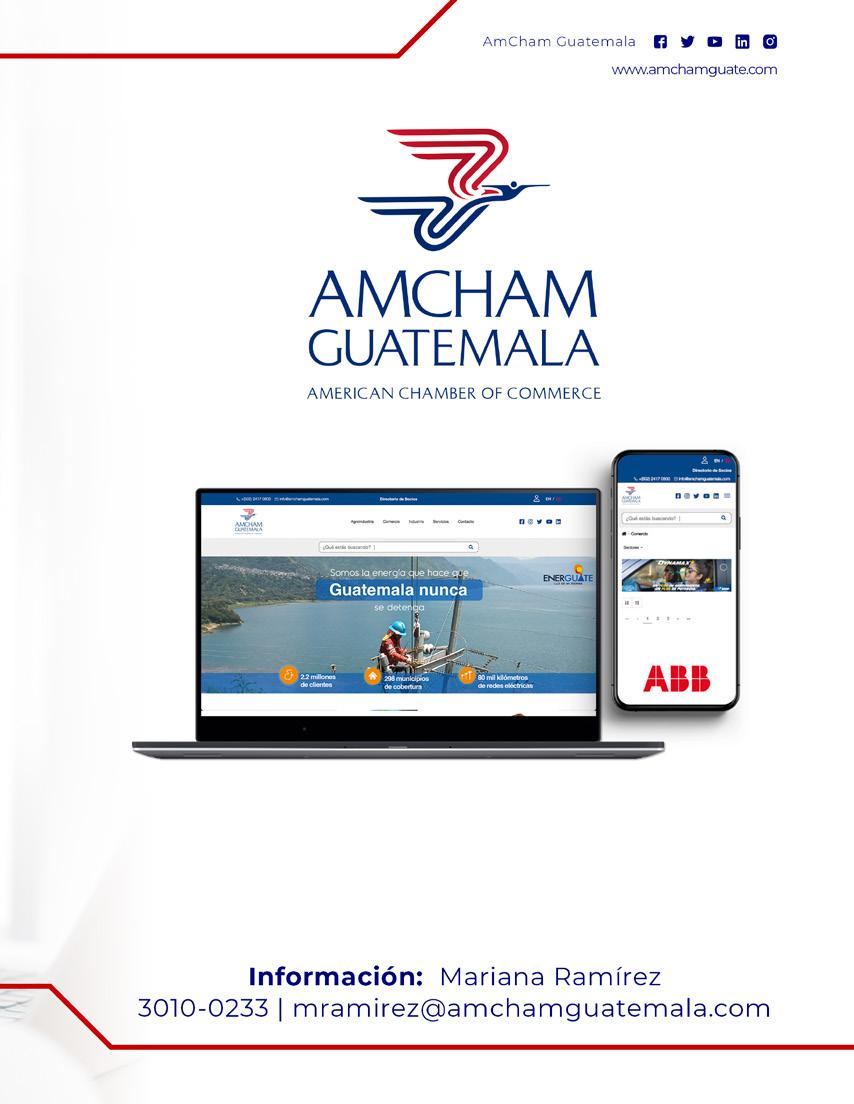


Es muy claro que durante la pandemia pudimos darnos cuenta de lo importante que es tener una buena salud y apreciamos más el valor que le debemos dar en nuestro diario vivir.
Luego de varios estudios realizados por entidades dedicadas a la salud, instituciones educativas a través de la investigación y CDC (Centros para el control y la prevención de enfermedades), se ha determinado que en la mayoría de las personas que contraen la enfermedad Covid-19 si hay efectos de mediano y largo plazo, algunos de los síntomas post Covid-19 (Mayo Clinic, 2022) son los siguientes:
• Fatiga
• Síntomas que empeoran después de esfuerzo

físico o mental
• Síntomas respiratorios
• Fiebres
• Otros síntomas que se manifiestan pueden ser:
• Afecciones de salud mental, dolores de cabeza, problemas para dormir, sensaciones de puntadas, depresión o ansiedad.
• Dolor articular o muscular.
• Afecciones o síntomas cardiacos
• Síntomas digestivos
• Coágulos o problemas de vasos sanguíneos (vasculares o embolia pulmonar)
• Salpullido y cambios en el ciclo menstrual
• Aunque se hace la aclaración que puede ser difícil determinar o distinguir si los síntomas se deben al padecimiento de Covid 19 o de otra enfermedad preexistente en el paciente.
También está claro que, otro tipo de condiciones a las que fuimos impulsados durante el confinamiento como desorden en la alimentación, sedentarismo y consumo excesivo de alcohol pudieron impulsar condiciones como colesterol y triglicéridos altos o desordenes del azúcar en la sangre (diabetes).
El regreso a la normalidad debería de implicar para nosotros regresar a las consultas frecuentes al médico, la realización de exámenes que nos

permitan tener claridad de nuestra condición de salud e iniciar o retomar la actividad física además de contar con un buen plan de alimentación que complemente la ecuación para mejorar nuestra condición.
Si a pesar de tomar todas las medidas preventivas surge una enfermedad o sufre un accidente, entonces es vital contar con una póliza de seguro de Gastos Médicos que permita minimizar el impacto económico.
Un corredor de Seguros le asesorará en contratar la póliza que mejor se adecúe a sus necesidades y presupuesto, no es lo mismo contemplar dentro de su presupuesto mensual una cantidad razonable que tener una emergencia que tenga que ver con su salud y que le genere mayor estrés por no disponer de los fondos necesarios para costear un tratamiento médico o una operación de emergencia.

It is very clear that during the pandemic we were able to realize how important it is to have good health and we appreciate more the value we must give it in our daily lives.
After several studies carried out by health entities, educational institutions through research and the Centers for Disease Control and Prevention (CDC), it was determined that most people who contract COVID-19 indeed present aftereffects in the medium and long terms. Some of the post COVID-19 symptoms (Mayo Clinic, 2022) are the following:
• Fatigue
• Symptoms that worsen after physical or mental efforts
• Respiratory symptoms
Fever
Javier Jerez
• Other symptoms that may be present are:
• Mental health conditions, headaches, sleep problems, throbbing sensations, depression or anxiety
Joint or muscle pain
• Heart conditions or symptoms
• Digestion symptoms
• Clots or blood vessel problems (vascular or pulmonary embolism)
• Rash and menstrual cycle alterations
• It should be noted that it may be difficult to determine or tell if the symptoms are due to COVID-19 or other pre-existing diseases in the patient.
It is also clear that other types of conditions that were forced upon us during confinement such as disorderly eating, physical inactivity and excessive alcohol consumption may have boosted conditions such as high levels of cholesterol and triglycerides or high blood sugar disorders (diabetes).

The return to normality should imply for us going back to frequent medical consultations, having lab tests that provide clarity about our health condition and taking up or resuming physical activity in addition to having a good diet that complements the equation to improve our condition.
If despite taking all the preventive measures, a disease emerges or an accident occurs, it is then vital to have a medical insurance policy that allows you to minimize the economic impact.
An insurance broker will advise you on acquiring the policy that best meets your needs and budget. It is not the same thing to deduct a reasonable amount from your monthly budget than having to face a health emergency that generates greater stress from not having the necessary funds to afford medical treatment or an emergency operation.


Después de haber atravesado una de las etapas mas difíciles como humanidad por la reciente pandemia mundial y de la que muchos no lograron salir adelante, podríamos pensar y valorar mas nuestra salud pues es un privilegio tenerla. Claro esta que para disfrutar de sus beneficios nos toca atender la misma adoptando costumbres y disciplinas que nos ayuden para obtener la misma y para ello es necesario pensar de forma integral. Es decir que cuando hablamos de salud muchas veces nos limitamos a tratar el tema de la alimentación y el dedicar cierto tiempo al ejercicio para así poder mantener un IMC (Índice de Masa Corporal) adecuado, así como cuidar los
indicadores de Química Sanguínea, sin embargo, pocas veces dedicamos cuidado a las horas que dormimos o a la salud mental y emocional que también son importantes para que podamos funcionar satisfactoriamente. La salud mental incluye nuestro bienestar emocional, psicológico y social. Afecta la forma en que pensamos, sentimos y actuamos cuando enfrentamos la vida. También ayuda a determinar cómo manejamos el estrés, nos relacionamos con los demás y tomamos decisiones. Atenderlos representa también cuidar nuestro cuerpo pues es allí donde terminara manifestándose. Cada día la vida requiere de más desafíos en cuanto al día a día nos referimos, pues nuestra sociedad se ha vuelto cada vez mas pesada por el trajín del día a día al punto de generar en nosotros una carga que debemos aprender a administrar para que no seamos presas de la rutina.
En 2021, más de 1 de cada 4 mujeres (29%) declaró haber recibido tratamiento de salud mental, en

comparación con menos de 1 de cada 5 hombres (18%). La Organización Mundial de la Salud ha llamado la atención sobre un aumento “masivo” de la ansiedad y la depresión a nivel mundial. Como en todo aspecto a atender en la vida es esencial que cada persona reconozca sus limitaciones y falencias para poder abordar el tema oportunamente y para ello es necesario contar con el acompañamiento de un profesional de la salud que entienda y pueda
brindar soluciones a las personas que estén siendo afectadas. En pocas ocasiones las personas buscan ayuda en un momento oportuno y generalmente lo hacen cuando ya se han visto afectadas, incluyendo su entorno. Uno de los desafíos a enfrentar es dar ese paso para pedir la ayuda necesaria para buscar volver a la normalidad y comprender que todos tenemos que administrar y ser intensionales en cuanto al cuidado de nuestra salud integral se refiere.

After going through one of the most difficult times in humanity due to the recent global pandemic, from which many did not pull through, we should stop to think and value our health more as it is a privilege to be healthy. Of course, to enjoy the benefits of good health, we have to take care of it by adopting habits and disciplines that help us to obtain it, for which it is necessary to think in a comprehensive way. In other words, when we talk about health, many times we limit ourselves to address the issue of our diet and to dedicate some time to do exercise in order to maintain an adequate Body Mass Index (BMI), as well as keeping an eye on blood chemistry indicators. Nonetheless, we rarely pay attention to the number of hours we sleep or to mental and emotional health, which are also important for us to function properly. Mental health includes our
Armando Palma H. General Director

emotional, psychological and social well-being. It affects the way we think, feel and act when we face life. It also helps to determine how to cope with stress, relate to each other and make decisions. To address these issues means also taking care of our bodies since it is there where they will end up manifesting themselves. Life requires facing more and more challenges each day since our society has become increasingly heavier due to the daily hustle and bustle, to the point of generating a burden within ourselves which we must learn how to manage in order not to fall prey to routine.
In 2021, more than 1 in 4 women (29%) manifested having received mental health treatment as compared to less than 1 in 5 men (18%). The World Health Organization has drawn attention to a global “massive” increase in anxiety and depression. As in every aspect to attend to in life, it is essential
that every person acknowledges their limitations and shortcomings in order to address this issue in a timely manner, for which it is necessary to be accompanied by a health professional who understands and provides solutions to affected people. People rarely seek timely help and they generally do it when they have already been
affected, including their environment. One of the challenges to be addressed is to take that step to ask for the necessary help to return to a normal state and to understand that we all have to willfully manage our comprehensive health’s care.



Perspectivas Segundo Semestre, 2023
Presencial | 12:00 p. m.
Expo Empleo Nacional
Presencial | 8:00 a. m.
¿Cómo iniciar mi empresa en EE. UU.? Eleve el nivel de sus negocios
Presencial | 9:00 a. m.
Presencial | 8:30 a. m.


Inteligencia Artificial, usos y oportunidades para las empresas

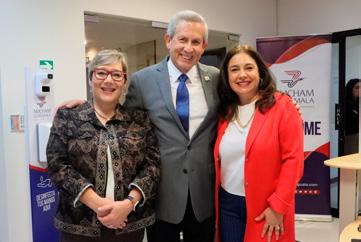

Artificial Intelligence, uses and opportunities for businesses
Sostenibilidad: Innovación, estrategias, índices y tendencias
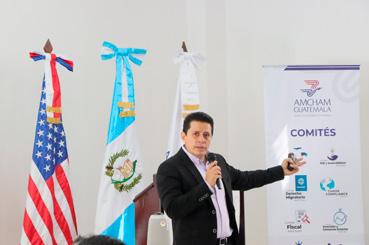

Sustainability: Innovation, strategies, indexes and trends
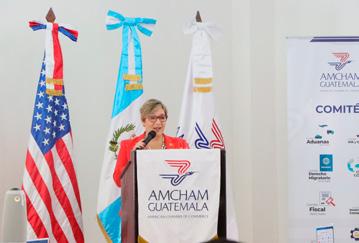
Sigue la conversación de los eventos en:


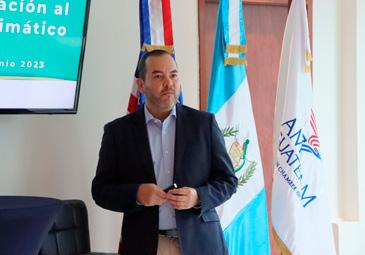
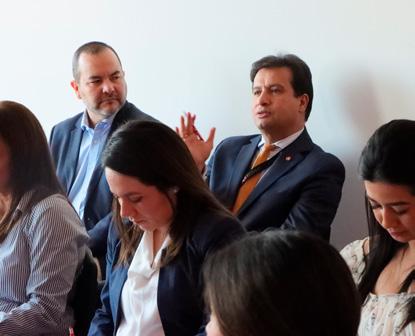




L a relocalización de cadenas o nearshoring está acercando a empresas como nunca a América, países como México y Brasil están a la cabeza de esta dinámica, empresas en particular manufactureras están buscando reubicarse para estar más cerca de sus mercados en especial Asia.

En la región centroamericana, Guatemala se ha convertido en un destino atractivo para la inversión extranjera directa y la práctica del nearshoring, entre 2020 y 2022, el país ha experimentado un crecimiento significativo en la recepción de inversión extranjera, así como en el aumento de las exportaciones e importaciones.
En los últimos dos años, según los datos del Ministerio de Economía, dan cuenta que el país recibió US$5700 millones en inversión extranjera directa, y en el 2022 experimentó un crecimiento notable en las exportaciones e importaciones, con incrementos del 15.2% y 20.7% respectivamente.

La entrada en funcionamiento en los últimos años de las Zonas de Desarrollo Económico Especial Públicas-ZDEEP- que autoriza la Junta Directiva de la Zona Libre de Industria y Comercio “Santo Tomás de Castilla”, con la certeza jurídica y beneficios fiscales, atraen importantes inversiones en la dinámica de la relocalización.
Estos nuevos espacios empiezan a ser un atractivo para nuevas inversiones, que al reubicar sus actividades empresariales, se benefician de costos operativos más
bajos y una mayor eficiencia logística, lo que les permite ser más competitivas en sus respectivos mercados. En Guatemala se encuentran autorizadas hasta ahora 3,690,632.92 de metros cuadrados en 12 zonas extra aduanales que ofrecen ubicación estratégica a lo largo y ancho del país, beneficios fiscales y logísticos, 4 de estás ZDEEP ya operan, 8 más esperan la autorización de la Superintendencia de Administración Tributaria- SAT-, para iniciar operaciones.

Lee la nota completa